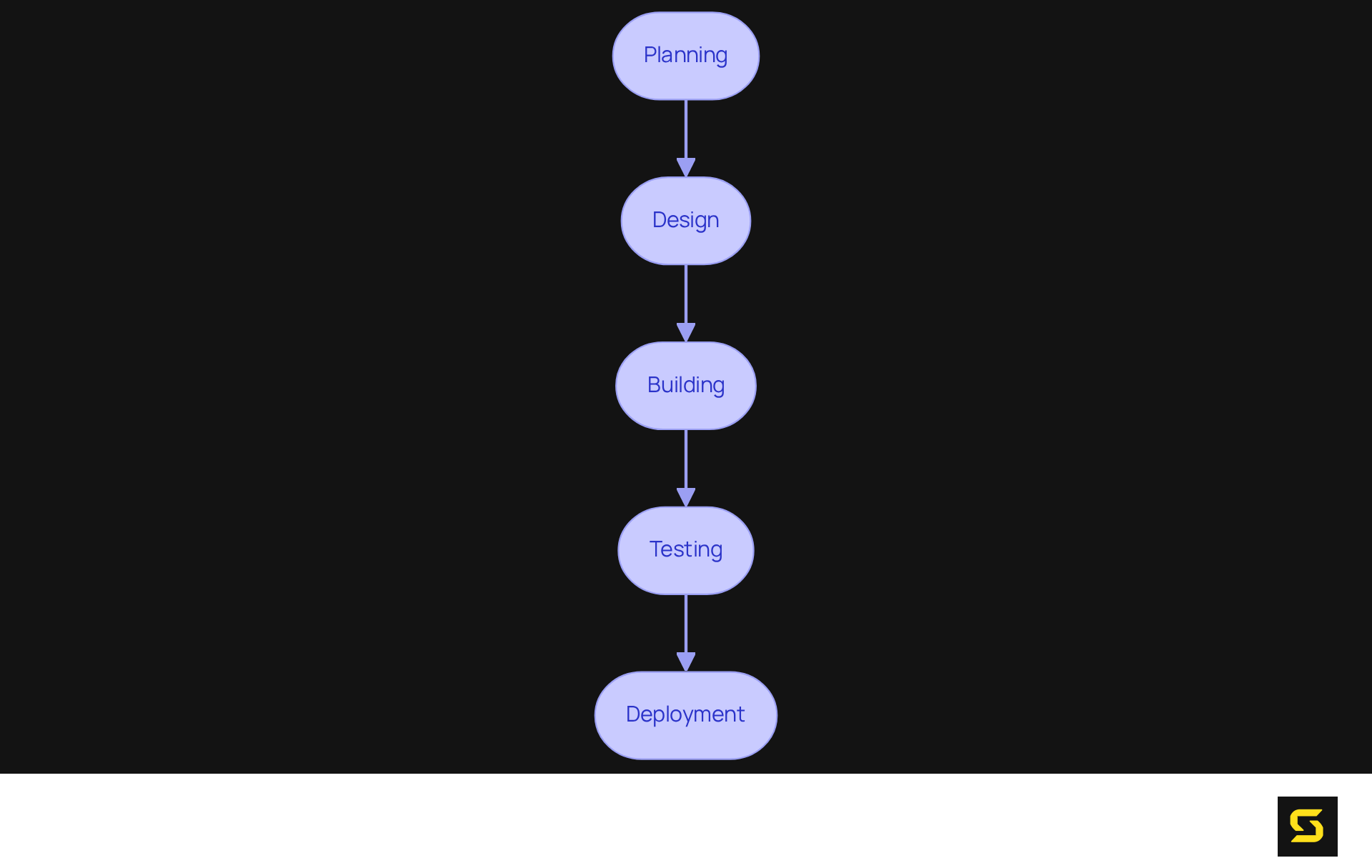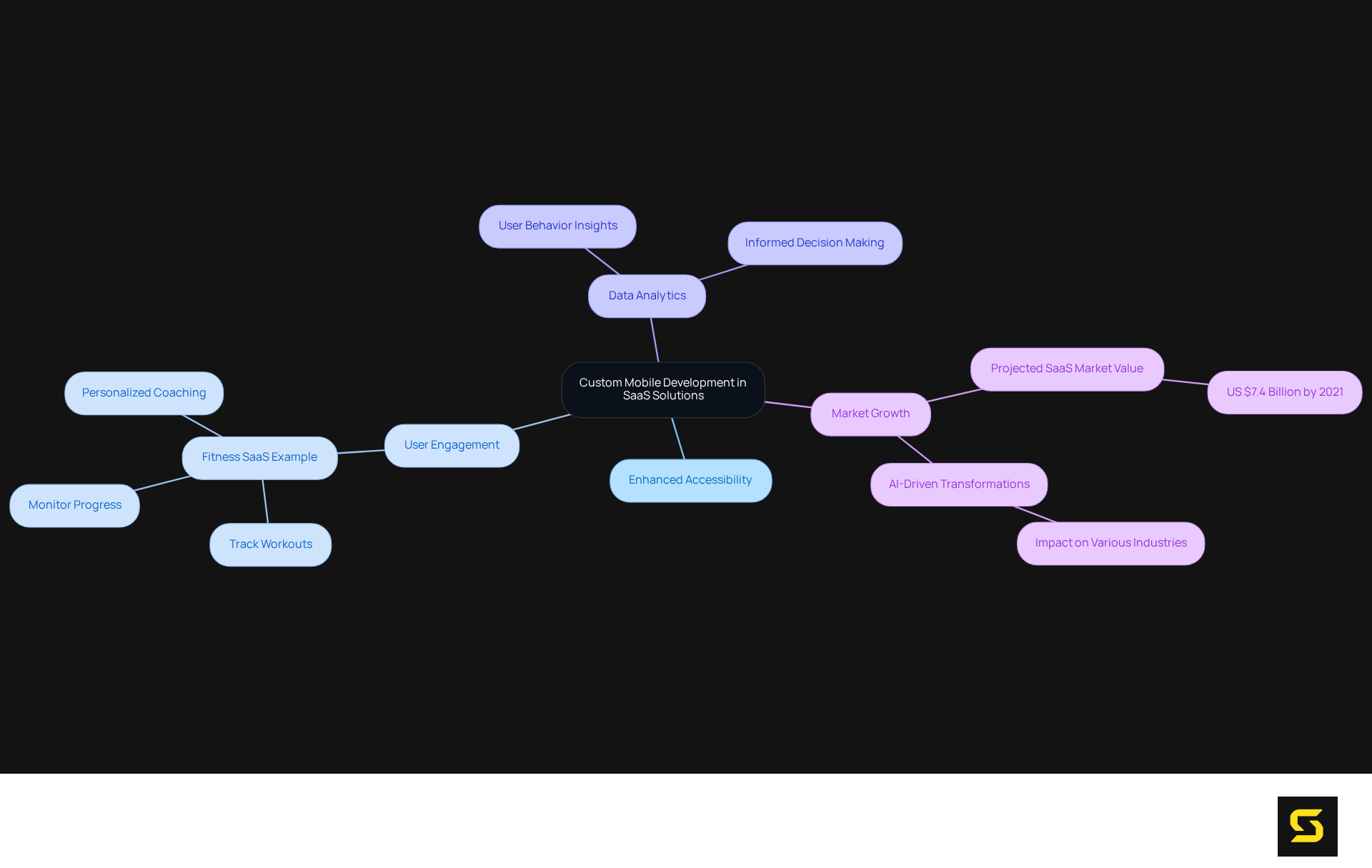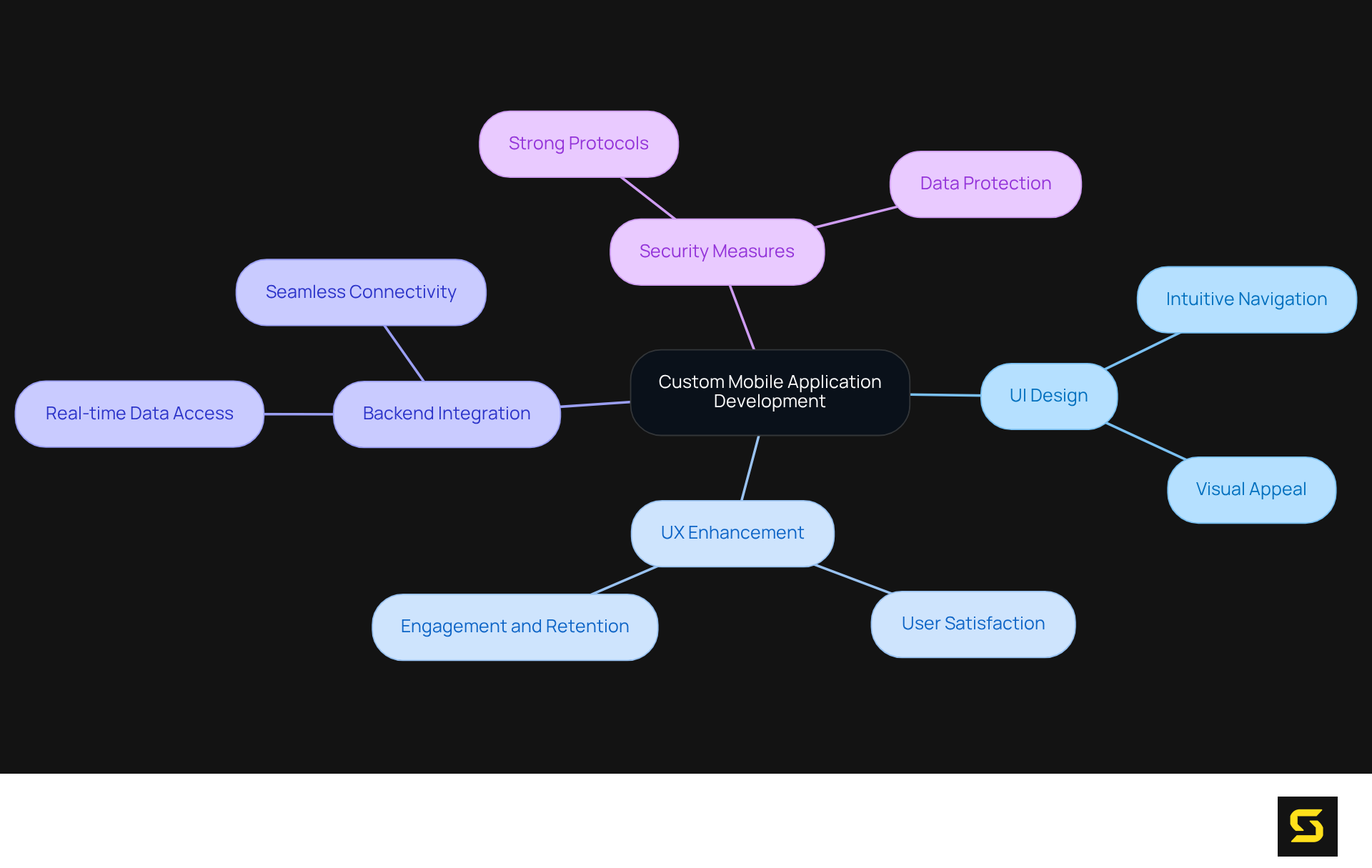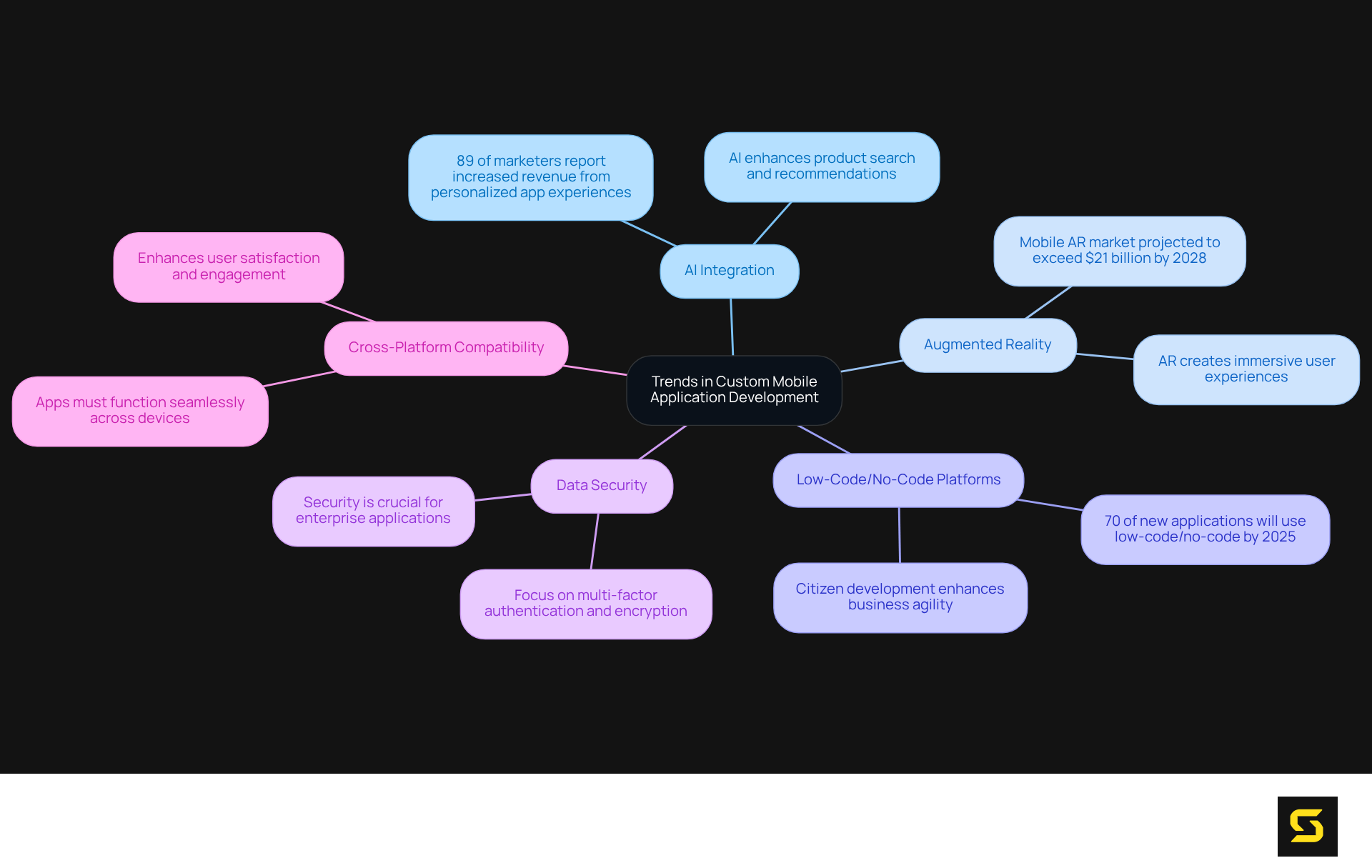Overview
Custom mobile application development services represent a pivotal solution for businesses seeking tailored mobile solutions that not only enhance user engagement but also drive operational efficiency. These services deliver a significant competitive edge through bespoke design and functionality. Moreover, they underscore the necessity of integrating emerging technologies alongside robust security measures, ensuring adaptability to the ever-evolving market demands. By leveraging these services, businesses can position themselves at the forefront of innovation, ready to meet the challenges of tomorrow.
Introduction
Custom mobile application development services are revolutionizing the operational landscape for businesses, providing bespoke solutions that align seamlessly with distinct organizational needs. By transcending generic applications, companies can significantly enhance user engagement, streamline operations, and secure a competitive advantage in an increasingly digital marketplace. However, as technology advances and consumer expectations evolve, the pressing question emerges: how can organizations harness these custom solutions to not only satisfy current demands but also anticipate future trends and challenges?
Defining Custom Mobile Application Development Services
Custom mobile application development services provide bespoke mobile solutions meticulously tailored to meet the specific needs of businesses and organizations. Unlike generic off-the-shelf options, our are specifically crafted from the ground up to ensure alignment with the unique workflows and requirements of each client. This tailored approach not only enhances user engagement but also streamlines operations, providing a significant competitive edge in today’s market. In fact, firms prioritizing custom mobile application development services are poised to gain a substantial advantage over those relying on generic solutions by 2025.
The creation process typically unfolds through several critical stages:
- Planning
- Design
- Building
- Testing
- Deployment
Each phase is essential for ensuring that the final product is functional, user-friendly, and adaptable to evolving business needs. For instance, businesses investing in custom mobile application development services can automate tasks such as inventory monitoring and order handling, leading to reduced operational expenses and heightened efficiency.
Successful examples of tailored application development illustrate its profound impact on business growth. Organizations that prioritize custom mobile application development services frequently experience elevated customer satisfaction and retention rates, as these personalized apps facilitate direct communication through features like push notifications and customized content. Furthermore, the ability to gather and analyze data from these platforms will become increasingly vital for competitiveness by 2025 and beyond, providing valuable insights into customer behavior that inform marketing strategies and product development.
Industry leaders underscore the necessity of tailored applications in maintaining a competitive advantage. As the market evolves, companies embracing innovation through customized solutions, including the integration of emerging technologies such as AI, AR, and IoT, are better equipped to meet changing client expectations and seize new opportunities. Additionally, enhanced security measures tailored to specific company needs are crucial for safeguarding sensitive consumer information. By 2025, utilizing custom mobile application development services will not merely be advantageous but essential for organizations striving to thrive in a fast-paced economy.

The Role of Custom Mobile Development in SaaS Solutions
Tailored smartphone software development is pivotal in enhancing [Software as a Service (SaaS)](https://sda.company) solutions through custom mobile application development services. By utilizing custom mobile application development services specifically designed to elevate SaaS offerings, companies can provide users with seamless access to services anytime and anywhere. This accessibility is vital in today's fast-paced digital landscape, where users expect to interact with applications on their mobile devices.
For instance, a fitness SaaS platform could leverage custom mobile application development services to create a customized application that enables users to track workouts, monitor progress, and receive personalized coaching, thereby boosting engagement and retention.
Moreover, utilizing custom mobile application development services to integrate mobile functionalities into SaaS solutions enhances data collection and analytics, empowering companies to make informed decisions based on user behavior. The SaaS market is projected to reach US $7.4 billion, highlighting the growth and significance of this sector.
As AI-driven SaaS solutions are set to transform various industries by 2025, incorporating custom mobile application development services becomes a strategic imperative for SaaS providers. Additionally, SaaS software solutions simplify maintenance and management for developers, facilitating easy updates and modifications.
With application usage on the rise—evidenced by a reported —the importance of custom mobile application development services in SaaS strategies is undeniable.

Key Features and Components of Custom Mobile Application Development
Key features and elements of custom mobile application development services include:
- Interface (UI) design
- Experience (UX) enhancement
- Backend integration
- Robust security measures
A thoughtfully designed interface facilitates intuitive navigation, enabling users to engage seamlessly with the application. Prioritizing UX is not merely beneficial; it is essential, as it significantly and engagement, thereby fostering loyalty and retention. Backend integration is crucial, linking the mobile application to existing databases and services, which allows for real-time data access and updates—an indispensable feature for dynamic experiences.
Moreover, establishing strong security protocols is imperative to protect personal information and maintain trust, especially in an era marked by frequent data breaches. Comprehensive testing throughout the development process is vital to ensure the app's performance and customer satisfaction. Additional features such as offline functionality, push notifications, and analytics capabilities further enrich the software, providing users with a comprehensive and efficient tool that meets their needs. Furthermore, bespoke applications can create new revenue streams through in-app purchases or subscriptions, yielding significant financial benefits for their developers. By focusing on these critical components, businesses can leverage custom mobile application development services to craft tailored mobile solutions that not only set them apart in a competitive market but also deliver exceptional user experiences.

Trends and Evolution in Custom Mobile Application Development
The landscape of custom mobile application development services is rapidly evolving, propelled by technological advancements and changing consumer expectations. A pivotal trend is the integration of artificial intelligence (AI), which significantly enhances personalization and audience engagement. Notably, 89% of marketers in the U.S. report increased revenue from apps due to personalized experiences driven by AI, underscoring its effectiveness in boosting engagement and revenue generation. This technology not only tailors content to individual preferences but also improves functionalities such as product search and suggestions, creating a more intuitive experience for users.
Furthermore, augmented reality (AR) is emerging as an essential tool for elevating user engagement, enabling businesses to craft immersive experiences that captivate users. The mobile augmented reality market is anticipated to surpass $21 billion by 2028, reflecting a substantial rise in demand for innovative features like AR.
The ascent of low-code and no-code platforms is another critical trend, facilitating quicker creation cycles and democratizing app production. By 2025, it is projected that 70% of new software will leverage these technologies, empowering individuals with limited coding skills to engage in app development.
As data privacy and security concerns continue to intensify, developers are prioritizing robust security measures, such as multi-factor authentication and encryption, to protect data and maintain user trust. This focus on is vital, particularly for enterprise systems, where vulnerabilities can lead to significant financial and reputational damage.
Moreover, the growing demand for cross-platform compatibility ensures that applications function seamlessly across various devices and operating systems, further enhancing user experiences. This evolution not only increases user satisfaction but also paves the way for innovation and business growth through custom mobile application development services in the competitive mobile app landscape.

Conclusion
Custom mobile application development services are not merely beneficial; they are essential for businesses aiming to create tailored solutions that align perfectly with their specific needs. By prioritizing custom development over generic applications, organizations can significantly enhance user engagement, streamline operations, and secure a competitive advantage in an increasingly digital marketplace.
Key points throughout this discussion highlight:
- The significance of a structured development process
- The integration of innovative technologies such as AI and AR
- The necessity for robust security measures
Custom applications can dramatically improve customer satisfaction and retention while facilitating data-driven decision-making. Moreover, the evolving landscape of mobile app development—marked by trends like low-code platforms and cross-platform compatibility—illustrates the critical importance of staying ahead in a fast-paced environment.
In conclusion, embracing custom mobile application development services is not just an option; it is a strategic imperative for businesses looking to thrive in the future. As the demand for personalized user experiences and secure solutions continues to grow, investing in bespoke applications will be crucial for organizations seeking to innovate and meet the ever-changing expectations of their clients. Prioritizing these services today will undoubtedly pave the way for sustained growth and success in tomorrow's competitive landscape.
Frequently Asked Questions
What are custom mobile application development services?
Custom mobile application development services provide tailored mobile solutions specifically designed to meet the unique needs of businesses and organizations, as opposed to generic off-the-shelf options.
What are the benefits of using custom mobile applications?
Custom mobile applications enhance user engagement, streamline operations, and provide a competitive edge, leading to improved customer satisfaction and retention rates.
What are the critical stages in the custom mobile application development process?
The critical stages include Planning, Design, Building, Testing, and Deployment, each essential for ensuring a functional and user-friendly final product.
How can custom mobile applications improve business operations?
They can automate tasks such as inventory monitoring and order handling, which leads to reduced operational expenses and increased efficiency.
Why is data analysis important in custom mobile applications?
The ability to gather and analyze data from custom mobile applications provides valuable insights into customer behavior, which can inform marketing strategies and product development.
What role do emerging technologies play in custom mobile application development?
Integrating emerging technologies such as AI, AR, and IoT into custom applications allows companies to better meet changing client expectations and seize new opportunities.
Why is security important in custom mobile applications?
Enhanced security measures tailored to specific company needs are crucial for safeguarding sensitive consumer information.
How will the importance of custom mobile application development change by 2025?
By 2025, utilizing custom mobile application development services will be essential for organizations to thrive in a fast-paced economy, as it will provide a significant competitive advantage.





